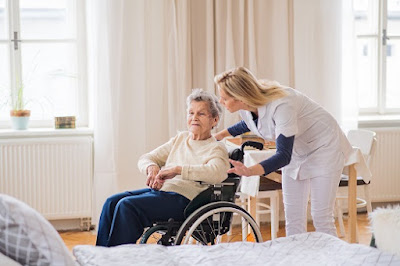Improving Mobility in the Elderly
People who age face many challenges. As we get older, our
mobility can become compromised in several ways. We may experience a decline in
physical ability and the ability to perform day-to-day tasks; a loss of memory
and cognitive functions; or changes in body chemistry that lead to falling more
frequently as we age. Mobility difficulties are common for seniors, with one
third of people over the age of 70 having some mobility problems. In addition
to being harder to detect, mobility problems are often untreated due to a
variety of reasons.
Finding the right combination of exercise and lifestyle
modifications can help older adults increase mobility and stay more socially
engaged with their family and friends. In this article, nursing home owner
Ephraim Zagelbaum explains what you should know about limited mobility for
seniors and tips to keep active.
Participate in Daily Exercise
Studies show that a combination of daily exercise and a
healthy diet can help improve mobility for people over the age of 65. Regular
exercises such as walking and standing up can improve balance and reduce the
risk of developing disabilities such as muscle spasticity and balance problems.
People who participate in physical activity regularly can reduce the likelihood
of experiencing cognitive changes associated with aging. Regular exercise not
only keeps your body fit and strong, it can also decrease your blood pressure
and improve your cholesterol.
If you are planning to start a physical fitness routine,
Ephraim Zagelbaum recommends consulting a physician first to ensure the activity
is safe for you. Even a simple walk around the neighborhood can be
challenging. Stretching and warming up properly beforehand will help prevent
injuries and maximize physical benefits. Additionally, it is important to wear
shoes with adequate support and clothing that is comfortable and fits properly.
For seniors with mobility issues, low-impact activities offer many health
benefits.
Monitor Diet and Weight
Making healthy diet choices and not going overboard on the
calories consumed is important for people of all ages. As we get older, eating
a healthy diet rich in fiber and complex carbohydrates helps prevent
constipation, which can lead to reduced mobility. Unfortunately, many seniors
end up eating too many calories and gaining weight. This is often due to a poor
diet and an increase in body-fat as a result of a declining metabolism. People
who want to prevent becoming obese should consider eating a high-fiber diet,
consuming light or moderate exercise, and avoiding rich, fatty foods.
For people with mobility issues and those already
experiencing restricted motion, a protein-rich diet is recommended. Leg
movement can be restricted by certain health conditions, such as obesity, which
places a greater strain on the joints. The key to staying mobile as you age is
to maintain a healthy weight. Regular exercise and monitoring existing health
issues, such as diabetes, are necessary in addition to diet.
As the Founder and CEO at Personal Healthcare, Ephraim
Zagelbaum understands the impact diet and exercise can have on senior health
outcomes. He emphasizes these factors through Personal Healthcare's long-term
care services and therapeutic recreation activities.
Benefits of Nursing Home Living and Active Retirement
Many people who spend their later years in a nursing home or
an assisted living facility are reluctant to give up their active lifestyles. A
good way to ease someone’s fears is to explain that they must continue to take
care of themselves during their retirement years. Typically, active people who
go into nursing home care can lose most of their physical abilities as they
age. This can be a scary thought for people who want to continue to enjoy
activities that they enjoy. Fortunately, there are a number of factors that can
help reduce the effects of aging on mobility. All people over the age of 65
should consider participating in a physical activity program when they are
placed in a nursing home.
Bottom line
For seniors, physical activity is important, but safe and
functional mobility involves more than exercise. A nursing home or assisted
living facility can offer seniors the benefits of living independently, while
also providing the resources and support necessary to stay active and move
around safely without risking serious injury or social isolation when living
alone or at home is no longer an option.
Increasing mobility and staying active are important factors
for the physical, mental, and emotional well-being of seniors. It is important
for older adults to understand stretching exercises, as well as safe,
low-impact activities, in order to determine what kind of physical activity is
best for them. As a result, nursing homes may help seniors maintain healthy
mobility and get the exercise they need.




Comments
Post a Comment